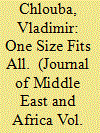| Srl | Item |
| 1 |
ID:
182868


|
|
|
|
|
| Summary/Abstract |
While much has been written about the resurgence of traditional authorities in sub-Saharan Africa, we know less about what explains differences in the institutional and regulatory frameworks that link traditional leaders to formal governments. Even though they have rarely been applied to resurging traditional leaders, existing theories of institutional choice are likely to yield important insights when applied to different models of mixed governance. In this article, the author closely examines the origins of the institutional framework that presently governs the relations between the central government and traditional authorities in Namibia. The author finds that both exogenous motivations such as the ideology of policymakers and endogenous determinants such as the potential for electoral mobilization matter for understanding the forms that mixed governance takes.
|
|
|
|
|
|
|
|
|
|
|
|
|
|
|
|
| 2 |
ID:
089474


|
|
|
|
|
| Publication |
2009.
|
| Summary/Abstract |
The long-standing debate about the proper role for Africa's traditional leaders in contemporary politics has intensified in the last two decades, as efforts to foster democratisation and decentralisation have brought competing claims to power and legitimacy to the fore, especially at the local level. Questions persist as to whether traditional authority and democratic governance are ultimately compatible or contradictory. Can the two be blended into viable and effective hybrid systems? Or do the potentially anti-democratic features of traditional systems present insurmountable obstacles to an acceptable model of integration? Survey data collected by the Afrobarometer indicate that Africans who live under these dual systems of authority do not draw as sharp a distinction between hereditary chiefs and elected local government officials as most analysts would expect. In fact, popular evaluations of selected and elected leaders are strongly and positively linked. They appear to be consistently shaped by each individual's 'leadership affect', and by an understanding of chiefs and elected officials as common players in a single, integrated political system, rather than as opponents in a sharply bifurcated one. Moreover, there is no evident conflict between supporting traditional leadership and being a committed and active democrat. Rather than finding themselves trapped between two competing spheres of political authority, Africans appear to have adapted to the hybridisation of their political institutions more seamlessly than many have anticipated or assumed.
|
|
|
|
|
|
|
|
|
|
|
|
|
|
|
|